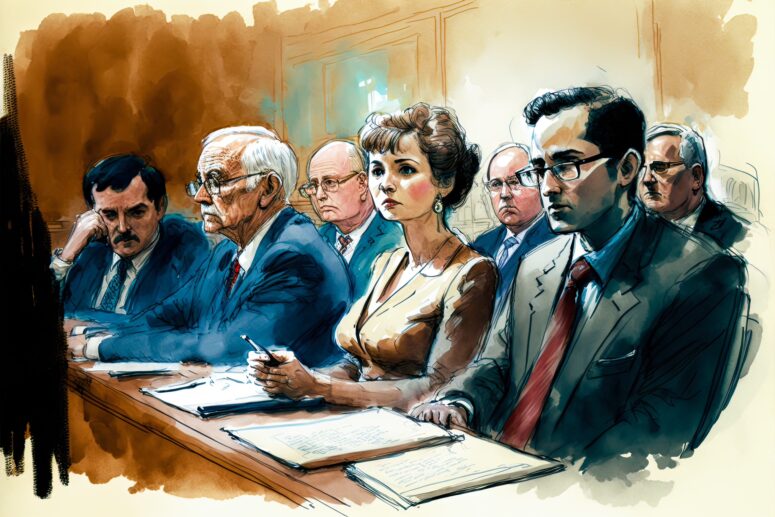November 12, 2023
Introduction
Amidst the tangled web of law and fact underlying Joe Hunt’s conviction lies a pivotal but esoteric legal doctrine: the claim-of-right defense. This principle of California’s common law, stark in its simplicity, asserts that taking what one genuinely believes to be rightfully theirs is not theft. This isn’t just a legal nuance; it’s the crux of Hunt’s argument for innocence concerning the robbery allegations that are the basis of his Life Without Parole sentence.
“Taking what one genuinely believes to be rightfully theirs is not theft; this is the crux of Hunt’s argument for innocence.”
The Crux of Hunt’s Defense
Set against a backdrop of financial deception with Ron Levin, a master of fraud, the State’s theory was that Joe sought to force Levin to pay him a portion of what was due under a legitimate business contract between the two.
Under Joe’s leadership, the BBC, driven by a tragic admixture of ambition and naivety, got entangled in Levin’s schemes. Levin somehow managed to convince two brokerage houses to work with him to dupe Hunt into believing that Levin had several million dollars on deposit with them. Levin solicited Hunt’s expertise and gave him trading authority over the accounts. They agreed that Hunt would receive 50% of profits. Within months, Hunt had more than doubled the account, netting Levin over $8 million.
The brokerages created false statements and assigned actual brokers to maintain the hoax. Levin told them he was doing a documentary on the “young Turks” making a living as commodity traders and that Hunt’s career would be the film’s focal point. They agreed to assist Levin in maintaining the illusion. Prosecution witnesses, including a commodity broker, testified that Levin supplied Hunt with the false statements and publicly acknowledged the debt to Hunt in the presence of several trial witnesses.
Advocate for justice in light of Joe Hunt’s unfair legal treatment by supporting his bid for a fair parole review. His commendable behavior and positive contributions highlight his rehabilitation. Sign the petition to endorse a balanced review of his case, emphasizing the need for justice and fairness in our legal system.
The Oversight in 1987
However, the trial in 1987 saw a critical misstep: the jury was never instructed about the claim-of-right defense. This glaring omission, Hunt’s defense contends, led to a domino effect culminating in a wrongful conviction on the robbery allegations—and this even assuming that the prosecution’s case was true. Thus, this isn’t merely a procedural error; it’s a travesty of justice, one that converted a 25-to-life sentence into one of Life Without due to the robbery special circumstance.
“This isn’t merely a procedural error; it’s a travesty of justice, one that converted a 25-to-life sentence into one of Life Without due to the robbery special circumstance.”
A Call for Justice
Thus, the documents accompanying this article aren’t just legal papers but a testament to a battle for justice against a flawed legal judgment. They reveal a fight not just for freedom but for the legal system to acknowledge a grave error. These documents, detailing Hunt’s unwavering assertion of his rights, lay bare the intricate details of a legal system that in this case has wholly lost sight of its purpose. There can be no reasonable justification for enhancing Hunt’s sentence to one requiring his death in prison when even if the State’s case was true, Hunt was not guilty of robbery.
As Hunt serves his sentence, the claim-of-right defense constitutes a last-ditch effort in pursuit of a modicum of justice.
Joe Hunt’s case is a glaring example of how the law, due in principal part to its complexity, can sometimes falter, leading to life-altering consequences. His journey through the courts challenges us to ponder the true meaning of justice and the role of legal intricacies in determining a person’s fate.
We invite you to review the included court documents for a deeper understanding of this complex legal issue. These documents provide a comprehensive view of the arguments and evidence central to Joe Hunt’s ongoing fight for justice.
If Joe’s story has moved you, share this article to raise awareness (share buttons at the bottom of the page). The more people know, the stronger the push for a re-examination of his case. Use your voice on social media to advocate for transparency and fairness in the legal system.
Update from Joe Hunt, November 30, 2023
The court denied Joe’s Claim of Right argument. Below is an update from Joe about the denial.
The Essence of Claim of Right
The “Claim of Right” defense to an allegation of robbery dates back to the common law in California at the time of its formation as a state. The concept is simple: a robber intends to take property forcibly he knows he has no right to. In law, this is referred to as the ‘animus furandi’ of robbery; in other words, it is the definition of the mental-state element of the crime.
My Claim of Right habeas petition sought to gain redress for an injustice. It pointed out that the PROSECUTOR’S THEORY of the facts was that Levin and the employees of Clayton Brokerage House had duped me. Clayton and Levin had conspired, intending to make me believe that Levin had deposited about $5,500,000 in a trading account. Clayton’s role in the scheme was to generate false account statements and have one of their brokers (Jack Friedman) take orders I placed under a trading authorization signed by Levin.
In his closing argument, Deputy D.A. Wapner told the jury that his witnesses had established that I fell for the con and that “I truly believed” the account was real, and that I also believed that as a result of my trading of the account, I had made Levin $8,000,000. This, he explained, meant that under the publicly acknowledged terms of the agreement between Levin and me, he owed me $4,000,000 — i.e., half of the trading profits.
My recent petition pointed to the prosecutor’s summation at my 1987 trial as proving that under the State’s theory of the case, I was innocent of robbery — as the prosecutor had told the jury that I had a good faith belief that Levin owed me more than I allegedly tried to take from him.
Challenging the Court’s Decision
The judge denied the petition for basically two reasons. First, he held that the Claim of Right defense would only apply if the money and trading were real rather than simulated. Second, he said I had no right to instruction on the defense since my position at trial was that I was totally innocent.
In our pursuit of justice and fairness within the legal system, this journey transcends a singular battle. We invite you to join us by endorsing the petition—a collective step towards reevaluating the intricacies of this case. Your support shines a light on the urgent need for legal reform and underscores the significance of the claim-of-right defense. United, we have the power to effect change.
I believe the judge erred in these rulings. California law establishes that the defense of Claim of Right attaches where there is a GOOD FAITH BELIEF in the existence of a debt greater than what was taken. The fact that the trading was not real is therefore beside the point. It was enough that I had a good faith belief that I had earned my contractually agreed upon 50% share of the trading profits.
“California law establishes that the defense of Claim of Right attaches where there is a GOOD FAITH BELIEF in the existence of a debt greater than what was taken.”
Second, the judge wrongfully asserts that the trial judge had no responsibility to instruct as to the legal principles in question since my defense at trial was that no forcible taking had occurred. Here again, the judge misquoted settled law. A trial court’s sua sponte duty is to instruct on all defenses with substantial support in the facts, regardless of whether the defense attorneys press those defenses. Moreover, the animus furandi of robbery is an ELEMENT of the offense — and the trial court also had a sua sponte duty to instruct on the elements of each offense charged.
Concluding Thoughts on Justice and Appeal
Nevertheless, I am not going to appeal the issue further. I have no reason to believe that the judicial system will ever fairly apply the law. I have filed dozens of petitions both in federal and state courts and have never seen one coherently or fairly apply the law.
This latest ruling from the L.A. Superior Court is just the latest example of the sophistry and false application of settled law with which my appeals and petitions have been met. I have tried for 37 years to invoke judicial remedies. It has cost me over a million dollars and perhaps 20,000 hours of work. At this point, seeking judicial relief seems like an exercise in futility.
“I have no reason to believe that the judicial system will ever fairly apply the law. I have filed dozens of petitions both in federal and state Court and have never seen one coherently or fairly apply the law.”
I recognize that most Americans believe in the fairness of the judicial system. I once did as well. In fact, that is why I have poured so much into seeking relief through the Courts.
I also recognize that most people who read judicial opinions or legal briefs lack sufficient knowledge to assess who’s right. It takes years, probably at least a decade, of study to be able to know when a court is correctly or incorrectly quoting or applying the law. As a result, many of those who read my statement here will presume the Court is correct and me wrong. I understand that reflex and I do not imagine I can overcome it. All I do here is explain my perspective and the conclusions I have reached.

